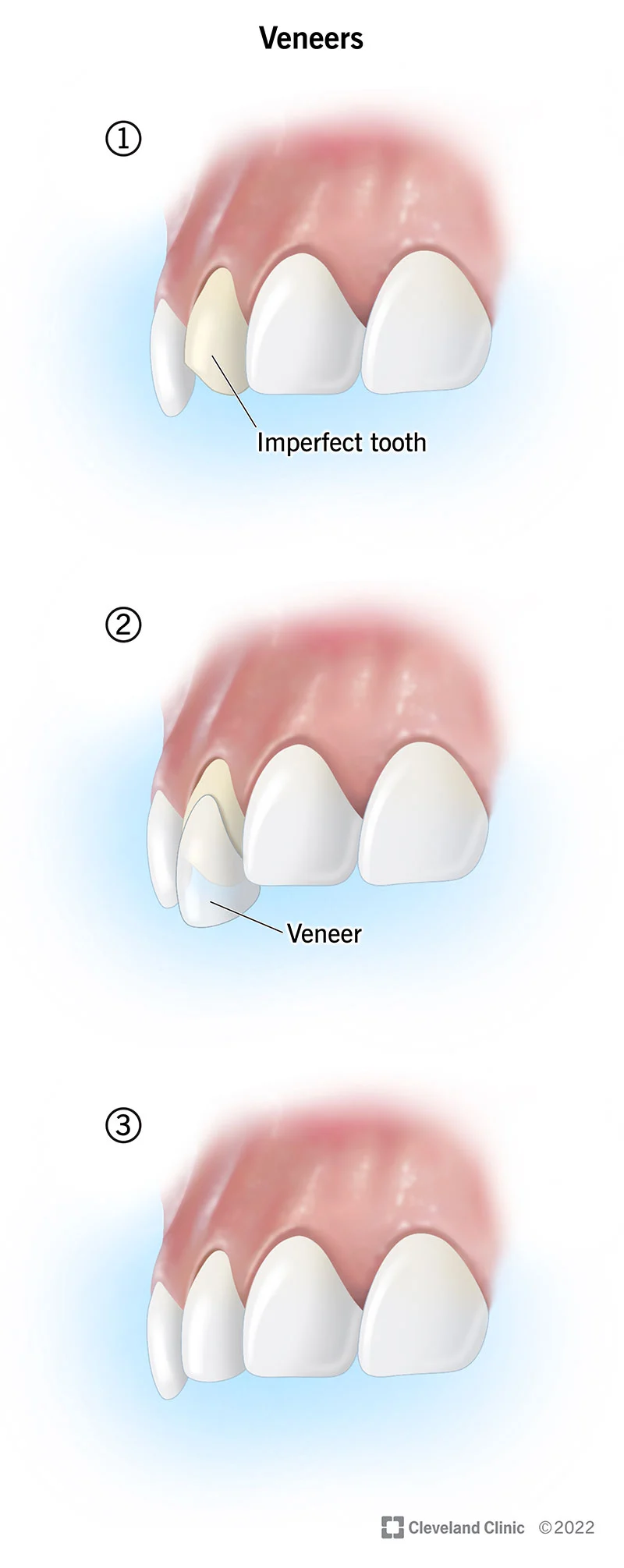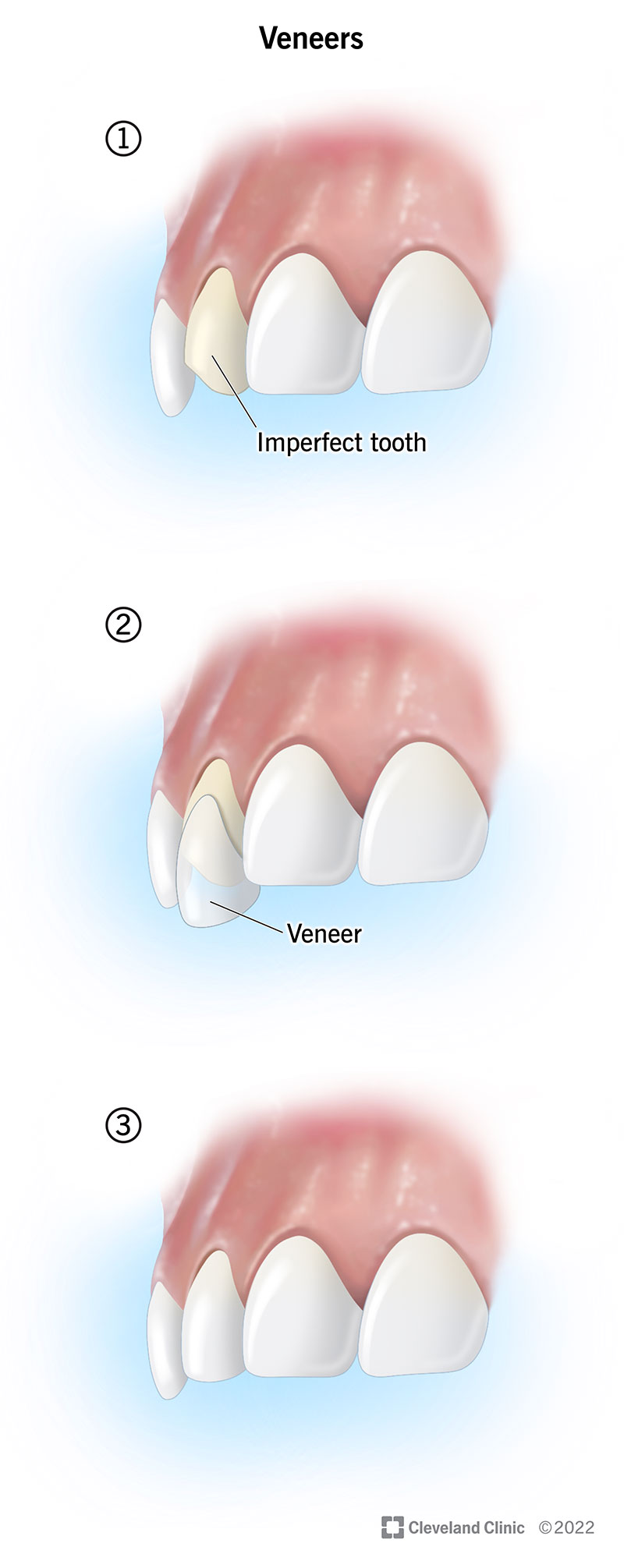
Are veneers safe long-term? Fear not! They’re a safe and effective cosmetic dental treatment, custom-made shells bonded to your teeth to enhance appearance. Commonly used for chipped, stained, or misaligned teeth, veneers pose minimal and rare risks. Your dentist evaluates your oral health, discussing potential concerns before the procedure. While generally safe, there’s a slight chance of sensitivity or chipping, emphasizing the need for oral hygiene and open communication with your dentist. Dental veneers are a secure option for achieving a dazzling smile and elevating your confidence!
Are Dental Veneers Safe?
Dental veneers are thin shells made of porcelain or composite resin that are bonded to the front surface of the teeth to improve their appearance. They can be used to correct various cosmetic issues such as discoloration, chipped or broken teeth, gaps between teeth, and misalignment. While dental veneers are a popular choice for enhancing the smile, many people have concerns about their safety. In this article, we will explore the safety of dental veneers and address some common questions and misconceptions.
What Are Dental Veneers?
Dental veneers are custom-made to fit each individual’s teeth and are designed to look natural. They are usually made from porcelain, which is known for its durability and ability to mimic the appearance of natural teeth. Composite resin veneers are an alternative option that can be more affordable but may not last as long as porcelain veneers.
When it comes to the safety of dental veneers, it is important to note that the procedure is considered safe and has been widely used for many years. However, as with any dental treatment, there are certain factors to consider and potential risks to be aware of.
The Safety of Dental Veneers
Dental veneers are considered a safe treatment option when performed by a qualified dentist or prosthodontist. The procedure involves removing a thin layer of enamel from the front surface of the teeth to create space for the veneers. This step is irreversible, and it is crucial to ensure that the teeth are healthy and structurally sound before proceeding with the treatment.
The materials used for dental veneers, such as porcelain or composite resin, are biocompatible and well-tolerated by the body. They are designed to be resistant to staining and durable enough to withstand normal biting and chewing forces. With proper care and regular dental check-ups, dental veneers can last for many years without any complications.
Benefits of Dental Veneers
Dental veneers offer several benefits that contribute to their popularity as a cosmetic dental treatment. Here are some of the advantages of dental veneers:
1. Improved appearance: Dental veneers can transform the smile by addressing common aesthetic concerns such as discoloration, chips, cracks, and gaps between teeth. They can create a more harmonious and symmetrical smile, enhancing a person’s self-confidence.
2. Natural-looking results: Porcelain veneers are known for their ability to closely mimic the appearance of natural teeth. The ceramic material used in porcelain veneers reflects light in a similar way to natural tooth enamel, resulting in a realistic and aesthetically pleasing smile.
3. Stain resistance: Porcelain veneers are highly resistant to staining, making them a suitable option for individuals who enjoy consuming foods and beverages that may cause tooth discoloration, such as coffee, tea, and red wine.
4. Durability: When properly cared for, dental veneers can last for a decade or more. Regular oral hygiene practices, including brushing, flossing, and routine dental visits, can help maintain the longevity of veneers.
5. Minimal invasiveness: Compared to other dental procedures, such as dental crowns or orthodontic treatments, dental veneers require minimal alteration to the natural teeth. The removal of a thin layer of enamel is usually sufficient for the veneers to be bonded securely and comfortably.
The Process of Getting Dental Veneers
- Consultation:
- Schedule a consultation with a dentist or prosthodontist.
- Assessment of oral health and tooth structure to determine veneer suitability.
- Decision to Proceed:
- After evaluating, dentist decides to proceed with veneers.
- Preparation involves the removal of a small amount of enamel, done under local anesthesia for comfort.
- Impressions for Custom Veneers:
- Impressions of teeth taken to create custom veneers tailored to the individual’s smile.
- Veneer Bonding:
- During the next appointment, veneers are bonded to the teeth using a special dental adhesive.
- Necessary adjustments made for proper fit and bite.
- Final Result:
- The outcome is a beautiful, natural-looking smile that enhances the individual’s overall appearance.
In summary, dental veneers are a safe and effective cosmetic dental treatment when performed by a qualified professional. They offer numerous benefits, including improved appearance, natural-looking results, stain resistance, durability, and minimal invasiveness. If you are considering dental veneers, it is important to consult with a dental professional who can assess your individual needs and guide you through the process to achieve the smile you desire.
Key Takeaways: Are Dental Veneers Safe Long-Term?
- Dental veneers are generally considered safe when performed by a qualified dentist.
- However, some potential risks and complications may arise, such as tooth sensitivity or damage to the underlying teeth.
- It is important to choose a skilled and experienced dentist to minimize these risks.
- Proper oral hygiene and regular dental check-ups are crucial for maintaining the longevity and safety of dental veneers.
- Consultation with your dentist is essential to determine if dental veneers are the right option for you.
Frequently Asked Questions
Dental veneers are a popular cosmetic dentistry option that can help improve the appearance of your teeth. However, it’s important to understand the safety aspects of this procedure. Here are some common questions and answers related to the safety of dental veneers.
1. What are dental veneers made of?
Dental veneers are typically made of porcelain or composite resin materials. Porcelain veneers are known for their durability and natural appearance, while composite resin veneers are more affordable but may not last as long. Both materials are considered safe and biocompatible for dental use.
Before getting dental veneers, your dentist will discuss the material options with you and recommend the one that suits your needs and preferences best.
2. Can dental veneers damage my teeth?
When properly applied and maintained, dental veneers should not cause any damage to your teeth. The process of getting veneers involves removing a small amount of enamel from the front surface of your teeth to create space for the veneers. This is a minimal and controlled process that should not weaken your teeth.
However, it’s important to practice good oral hygiene and avoid habits that can potentially damage your veneers, such as biting hard objects or using your teeth as tools. Regular dental check-ups and cleanings are also essential to monitor the condition of your veneers and ensure their longevity.
3. Are dental veneers reversible?
While dental veneers are considered a permanent cosmetic solution, they can be replaced or removed if needed. However, the process of removing veneers may require some additional dental work, such as reshaping the teeth or applying new veneers.
It’s important to discuss your expectations and long-term plans with your dentist before getting veneers to ensure that you are making an informed decision and understand the potential implications.
4. Do dental veneers require special care?
While dental veneers do not require any special care, it’s important to maintain good oral hygiene practices to keep your veneers and natural teeth in optimal condition. This includes brushing twice a day with a non-abrasive toothpaste, flossing daily, and visiting your dentist regularly for check-ups and cleanings.
Avoiding habits such as biting hard objects, grinding your teeth, or using tobacco products can also help prolong the lifespan of your veneers.
5. Are there any risks or complications associated with dental veneers?
Like any dental procedure, there are potential risks and complications associated with dental veneers. These can include tooth sensitivity, gum irritation, or veneer breakage. However, with proper care and maintenance, these risks can be minimized.
It’s important to choose an experienced and qualified dentist for your veneer procedure to ensure that it is performed correctly and minimize the risk of complications. Discuss any concerns or questions you may have with your dentist before getting veneers.
Are Porcelain Veneers Right for You?
Final Thoughts: Are Dental Veneers Safe?
Dental veneers are generally safe and effective cosmetic enhancements, with benefits outweighing minimal risks. Advanced research and technology, along with dentists’ rigorous training, contribute to their safety. Materials like porcelain or composite resin, proven safe for dental use, make veneers biocompatible. Though rare, individual experiences may vary, and complications can occur. Overall, veneers are a reliable option for smile enhancement, offering long-lasting results and improved oral health. Consult with a trusted dentist to address concerns and ensure a healthy foundation for achieving the dream smile.
Call or Book appointment online
:Ace Dental Care Alpharetta office: 678-562-1555 - Book Now
Ace Dental Care Norcross office: 770-806-1255 - Book Now
Disclaimer
This blog post was generated by artificial intelligence. The content of this post may not be accurate or complete, and should not be relied upon as a substitute for professional advice. If you have any questions about the content of this post, please contact us.
We are constantly working to improve the accuracy and quality of our AI-generated content. However, there may still be errors or inaccuracies. We apologize for any inconvenience this may cause.






